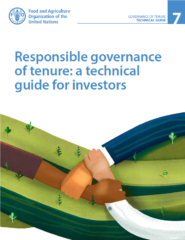
Most investment in agriculture in developing countries is in settings with weak governance of land tenure and where the prevalence of poverty is high. The Voluntary Guidelines on the Responsible Governance of Tenure of Land, Fisheries and Forests in the Context of National Food Security (“the Guidelines”), which were unanimously endorsed by the United Nations (UN) Committee on World Food Security in May 2012, were created to help these and other countries improve their governance of tenure.
The primary objective of the Guidelines is to reduce food insecurity and poverty. While aimed at governments, the Guidelines also contain important provisions applicable to the private sector. There is particular focus on helping investors pursue their projects in ways that respect legitimate tenure rights and human rights. Increasingly, the Guidelines are viewed internationally as establishing a set of best practices for investment in land, forests and fisheries.
Those who plan and operate their investments in a way that is consistent with the Guidelines can reduce their investment risk and increase the likelihood of realizing a reasonable risk-adjusted return. Such investments are more likely to be successful if everyone – investor, local community and government – benefits.
The Guidelines provide a framework for achieving this win-win-win scenario. This technical guide seeks to help investors apply the Guidelines in ways that will help them to play their part in achieving that result.
The document is also available in Spanish here.
